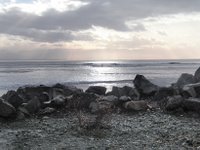
Intensifying Images With Photoshop Vivid Fog Effect

 Hi folks. Sorry for the lapse in postings. I actually managed to get a break from the computer to enjoy some sunshine in these waning days of summer. Back full force now, though, with a great tip from James, a friend and fellow Photoshop junkie. Vivid fog is an easy three-step effect (which you can turn into a Photoshop action) that adds drama to ordinary images, and can also be used to create striking silhouettes of foreground objects.
Hi folks. Sorry for the lapse in postings. I actually managed to get a break from the computer to enjoy some sunshine in these waning days of summer. Back full force now, though, with a great tip from James, a friend and fellow Photoshop junkie. Vivid fog is an easy three-step effect (which you can turn into a Photoshop action) that adds drama to ordinary images, and can also be used to create striking silhouettes of foreground objects.
To use this effect:
- Start with a quality image with good foreground/background delineation and subtle colour. Low light levels and the presence of an obvious foreground object or figure add more drama.
- Open the image in Photoshop and copy the background to new layer.
- Bump up the saturation of the new layer (to the maximum for the most drama).
- Apply a Gaussian blur to the new layer (10 pixels seems to work well, for 300 dpi images).
- Change the new layer's blend mode to Soft Light.
- Save your work in the appropriate file format.
Viola! James suggests you make these changes right on the background copy rather than applying adjustment layers. He also uses an "S" curve to heighten contrast, or a Levels adjustment to increase colour, such as the red in a sunset. He suggests making these adjustments before the saturation and blur steps.
 You can see before and after examples at the top of this article. As you can see, the colour in the original image was quite subtle before applying the vivid fog effect. At right is a third version, with the foreground masked to reduce the sense of underexposure created by this process.
You can see before and after examples at the top of this article. As you can see, the colour in the original image was quite subtle before applying the vivid fog effect. At right is a third version, with the foreground masked to reduce the sense of underexposure created by this process.Hope you find some interesting uses for this. Enjoy!




























2 comments:
Hello,
This is just a formal "Thank You" for all the wonderful information you have here on your blog. You've helped me get a great jumpstart on making my blog a better place to go. I initially found you when looking for a 3 column template but keep coming back for all of the other great stuff. Each time I have a question, you seem to have the answer.
Fabulous work!
Mark
Hey Mark, thanks so much for your kind words. Glad you're finding it useful!
Love your blog. Great cartoons :-)
Post a Comment